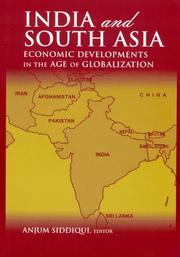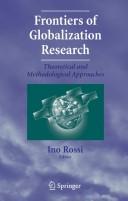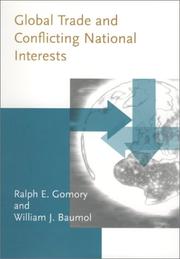| Listing 1 - 10 of 57 | << page >> |
Sort by
|
Book
ISBN: 9781788315159 1788315154 9781788315166 1788315162 1788316282 1788316290 1788316304 9781788316286 Year: 2019 Publisher: London, England : London, England : I.B. Tauris, Bloomsbury Publishing,
Abstract | Keywords | Export | Availability | Bookmark
 Loading...
Loading...Choose an application
- Reference Manager
- EndNote
- RefWorks (Direct export to RefWorks)
"In recent years, the effects of economic openness and technological change have fuelled dissatisfaction with established political systems and led to new forms of political populism that exploit the economic and political resentment created by globalization. This shift in politics was evident in the decision by UK voters to leave the European Union in June 2016, the November 2016 election of Donald Trump to the presidency of the United States, as well as the rise of populist movements on left and right throughout much of Europe. To many voters, the economy appears to be broken. Conventional politics is failing. Parties of the left and centre-left have struggled to forge a convincing response to this new phase of globalization in the aftermath of the 2008 crisis. This book examines the challenges that the new era of globalization poses for progressive parties and movements across the world. It brings together leading thinkers and experts including Andrew Gamble, Jeffry Frieden and Vivien Schmidt to debate the structural causes and political consequences of this new wave of globalization."--Bloomsbury Publishing.
382.11 --- Theorie van het internationale evenwicht. Economische onafhankelijkheid van een natie. Globalisering. Mondialisering --- Globalization --- International economic relations. --- Economic aspects. --- Economic policy, Foreign --- Economic relations, Foreign --- Economics, International --- Foreign economic policy --- Foreign economic relations --- Interdependence of nations --- International economic policy --- International economics --- New international economic order --- Economic policy --- International relations --- Economic sanctions
Book
ISBN: 9780511691515 0511691513 9780511691928 0511691920 9780511692635 0511692633 9780521196352 0521196353 9780521144537 0521144531 1107205158 9781107205154 0511849389 9780511849381 1282817914 9781282817913 9786612817915 6612817917 0511690037 9780511690037 0511689292 9780511689291 0511690770 9780511690778 Year: 2010 Publisher: Cambridge New York Cambridge University Press
Abstract | Keywords | Export | Availability | Bookmark
 Loading...
Loading...Choose an application
- Reference Manager
- EndNote
- RefWorks (Direct export to RefWorks)
Globalization and Competition explains why some middle-income countries, principally those in Asia, grow fast while others are not successful. The author criticizes both old-style developmentalism and the economics of the Washington Consensus. He argues instead for a 'new developmentalism' or third approach that builds on a national development strategy. This approach differs from the neoliberal strategy that rich nations propose to emerging economies principally on macroeconomic grounds. Developing countries face a key obstacle to growth, namely, the tendency to overvaluate foreign exchange. Instead of neutralizing it, the policy that rich countries promote mistakenly seeks growth through foreign savings, which causes additional appreciation of the national currency and often results in financial crises rather than genuine investment.
Economic development --- Finance --- Competition --- Developing countries --- Economic policy. --- E-books --- Business, Economy and Management --- Economics --- 331.31 --- 338.340 --- 338.8 --- 382.11 --- AA / International- internationaal --- NDC / Newly Industrialized Countries --- Economisch beleid --- Algemene ontwikkeling in de Derde Wereld --- Economische groei --- Theorie van het internationale evenwicht. Economische onafhankelijkheid van een natie. Globalisering. Mondialisering

ISBN: 0415349001 0415653428 9786610254637 1280254637 0203023846 9780203023846 9780415349000 9781134274024 1134274025 9781134273973 1134273975 9781134274017 1134274017 9780415653428 9781280254635 661025463X Year: 2005 Publisher: London : Routledge,
Abstract | Keywords | Export | Availability | Bookmark
 Loading...
Loading...Choose an application
- Reference Manager
- EndNote
- RefWorks (Direct export to RefWorks)
Efforts to combine the outstanding economic performance in the decades following the Second World War with social security appear to be endangered half way through the first decade of the 21st century. This book draws together an international team of contributors, including Douglass North, Harold Demsetz and Michael Piore to assess the current world order.
AA / International- internationaal --- 331.31 --- 330.52 --- 382.11 --- Economisch beleid. --- Liberaal systeem. Neo-liberalisme. Theorie van de onderhandeling. --- Theorie van het internationale evenwicht. Economische onafhankelijkheid van een natie. Globalisering. Mondialisering. --- Capitalism --- Economic policy --- Social policy --- Economic nationalism --- Economic planning --- National planning --- State planning --- Economics --- Planning --- National security --- Market economy --- Liberaal systeem. Neo-liberalisme. Theorie van de onderhandeling --- Economisch beleid --- Theorie van het internationale evenwicht. Economische onafhankelijkheid van een natie. Globalisering. Mondialisering --- Family policy --- Social history --- Profit --- Capital
Book
ISBN: 0691170924 0691133360 9786612820960 1400830729 1282820966 9781400830725 9780691133362 9781282820968 Year: 2009 Publisher: Princeton, N.J. Princeton University Press
Abstract | Keywords | Export | Availability | Bookmark
 Loading...
Loading...Choose an application
- Reference Manager
- EndNote
- RefWorks (Direct export to RefWorks)
Rules for the Global Economy is a timely examination of the conditions under which international rules of globalization come into existence, enabling world economic and financial systems to function and stabilize. Horst Siebert, a leading figure in international economics, explains that these institutional arrangements, such as the ones that govern banking, emerge when countries fail to solve economic problems on their own and cede part of their sovereignty to an international order. Siebert demonstrates that the rules result from a trial-and-error process--and usually after a crisis--in order to prevent pointless transaction costs and risks. Using an accessible and nonmathematical approach, Siebert links the rules to four areas: international trade relations, factor movements, financial flows, and the environment. He looks at the international division of labor in the trade of goods and services; flow of capital; diffusion of technology; migration of people, including labor and human capital; protection of the global environment; and stability of the monetary-financial system. He discusses the role of ethical norms and human rights in defining international regulations, and argues that the benefits of any rules system should be direct and visible. Comprehensively supporting rules-based interactions among international players, the book considers future issues of the global rules system.
Economics. --- International economic relations. --- International economic relations --- Economics --- Commerce --- International Commerce --- Business & Economics --- Economic policy, Foreign --- Economic relations, Foreign --- Economics, International --- Foreign economic policy --- Foreign economic relations --- Interdependence of nations --- International economic policy --- International economics --- New international economic order --- Economic theory --- Political economy --- Economic policy --- International relations --- Economic sanctions --- Social sciences --- Economic man --- E-books --- 337 --- 334.10 --- 382.11 --- AA / International- internationaal --- Algemene economie : algemeenheden --- Theorie van het internationale evenwicht. Economische onafhankelijkheid van een natie. Globalisering. Mondialisering

ISBN: 0765614529 1317468112 1315703521 9786610912414 1280912413 0765621533 9780765621535 0765621738 9780765621733 9781280912412 9781315703527 9781317468110 6610912416 9781317468103 1317468104 9780765614520 9781317468097 Year: 2007 Publisher: Armonk, N.Y. : M.E. Sharpe,
Abstract | Keywords | Export | Availability | Bookmark
 Loading...
Loading...Choose an application
- Reference Manager
- EndNote
- RefWorks (Direct export to RefWorks)
Examines the economies and geo-political developments of India, Pakistan, Afghanistan, Nepal, Bangladesh, Sri Lanka, and Bhutan. This work focuses on three core areas of importance: trade and development in the post-WTO era of globalization; macroeconomic adjustment and economic growth; and more.
Globalization. --- Investments, Foreign. --- Investments, Foreign --- Globalization --- Economic History --- Business & Economics --- South Asia --- Economic conditions. --- Economic policy. --- Global cities --- Globalisation --- Internationalization --- Capital exports --- Capital imports --- FDI (Foreign direct investment) --- Foreign direct investment --- Foreign investment --- Foreign investments --- International investment --- Offshore investments --- Outward investments --- International relations --- Anti-globalization movement --- Capital movements --- Investments --- 338.954 --- 331.30 --- 338.8 --- 382.11 --- ASI / Asia - Azië - Asie --- IN / India - Inde --- Economische toestand --- Economische groei --- Theorie van het internationale evenwicht. Economische onafhankelijkheid van een natie. Globalisering. Mondialisering
Book
ISBN: 9780300218046 9780300226300 0300226306 0300218044 Year: 2017 Publisher: New Haven, Conn. Yale University Press
Abstract | Keywords | Export | Availability | Bookmark
 Loading...
Loading...Choose an application
- Reference Manager
- EndNote
- RefWorks (Direct export to RefWorks)
A controversial look at the end of globalization and what it means for prosperity, peace, and the global economic order Globalization, long considered the best route to economic prosperity, is not inevitable. An approach built on the principles of free trade and, since the 1980s, open capital markets, is beginning to fracture. With disappointing growth rates across the Western world, nations are no longer willing to sacrifice national interests for global growth; nor are their leaders able-or willing-to sell the idea of pursuing a global agenda of prosperity to their citizens. Combining historical analysis with current affairs, economist Stephen D. King provides a provocative and engaging account of why globalization is being rejected, what a world ruled by rival states with conflicting aims might look like, and how the pursuit of nationalist agendas could result in a race to the bottom. King argues that a rejection of globalization and a return to "autarky" will risk economic and political conflict, and he uses lessons from history to gauge how best to avoid the worst possible outcomes.
Globalization --- International economic relations. --- Economic aspects. --- 382.11 --- 331.100 --- Theorie van het internationale evenwicht. Economische onafhankelijkheid van een natie. Globalisering. Mondialisering. --- Economische geschiedenis: algemeenheden. --- Economic order --- Protectionism. --- Anti-globalization movement. --- Alternative globalization movement --- Anti-capitalist movement --- Anti-corporate movement --- Fair trade movement --- Global justice movement --- Protest movements --- Free trade and protection --- Commercial policy --- E-books --- Theorie van het internationale evenwicht. Economische onafhankelijkheid van een natie. Globalisering. Mondialisering --- Economische geschiedenis: algemeenheden --- Alter-globalist movement --- Anticorporate movement --- Antiglobalization movement
Book
ISBN: 0801447771 0801462568 9780801462566 9780801447778 Year: 2018 Publisher: Ithaca, NY
Abstract | Keywords | Export | Availability | Bookmark
 Loading...
Loading...Choose an application
- Reference Manager
- EndNote
- RefWorks (Direct export to RefWorks)
In this explicitly comparative work, Dorothy J. Solinger examines the effects of global markets on the domestic politics of major states. In the late 1970's, leaders around the world faced a need both to continue productive investment and to cut labor costs to compete internationally in a changed world market. To accommodate forces seemingly beyond their control, they often opted to reduce social protections and benefits that citizens had come to expect, in the process recalibrating their established political-economic coalitions. For countries whose governance was built on a coalition between workers and the state, the political conundrum was particularly intense. States' Gains, Labor's Losses concentrates on three countries-China, France, and Mexico-where revolution-inspired political compacts between labor and the state had to be renegotiated. In all three cases, choices to forge a deepened dependence on international capital markets required the ruling parties to fire large numbers of workers and cut social benefits while attempting not to provoke widespread social unrest or even full-scale revolt among their supporters. China, France, and Mexico also shared strong legacies of protectionism and state intervention in the economy, so the decision of each to join a supranational economic organization (France and the EU, China and the GATT/WTO, Mexico and NAFTA) in the hope of alleviating crises of capital shortage involved submission to a new set of liberal economic rules that further compromised their sociopolitical compacts. Examining a fundamental question about the dynamics of globalization and worker protest through an innovative comparative perspective, States' Gains, Labor's Losses emphasizes the growing tensions and new compromises between the working class and their political leaders in the face of intense international economic pressures.
Industrial relations --- Labor policy --- China --- France --- Mexico --- Foreign economic relations. --- 332.10 --- 332.630 --- 332.691 --- 382.11 --- AA / International- internationaal --- CN / China - Chine --- FR / France - Frankrijk --- MX / Mexico - Mexique --- S10/0330 --- Betrekkingen tussen werkgevers en werknemers. Organisatie van de arbeidsverhoudingen in de industrie: algemeenheden --- Strijd tegen de werkloosheid: algemeen. Theorie en beleid van de werkgelegenheid. Volledige werkgelegenheid --- Evolutie van de arbeidsmarkt --- Theorie van het internationale evenwicht. Economische onafhankelijkheid van een natie. Globalisering. Mondialisering --- China: Economics, industry and commerce--Employment
Book
ISBN: 1136551115 1136551123 1282170805 1441617345 9786612170805 6000015712 1849773424 9781849773423 9781844076611 184407661X 9781136551123 9781136551079 1136551077 9781136551116 9781138993723 1138993727 Year: 2009 Publisher: London Sterling, VA Earthscan
Abstract | Keywords | Export | Availability | Bookmark
 Loading...
Loading...Choose an application
- Reference Manager
- EndNote
- RefWorks (Direct export to RefWorks)
Trade liberalization, as promoted by the World Trade Organization (WTO), has become one of the dominant drivers and most controversial aspects of globalization. Trade sustainability impact assessments (SIAs) were introduced as a means of generating better understanding especially of the social and environmental impacts of trade liberalisation, and of making those impacts more consistent with sustainable development. This book takes a hard look at the experience of Trade SIAs to date, and the extent to which they have achieved their objectives and improved the outcomes of trade negotiations. It
Commerce. --- Globalization. --- Sustainable development. --- Development, Sustainable --- Ecologically sustainable development --- Economic development, Sustainable --- Economic sustainability --- ESD (Ecologically sustainable development) --- Smart growth --- Sustainable development --- Sustainable economic development --- Economic development --- Global cities --- Globalisation --- Internationalization --- International relations --- Anti-globalization movement --- Trade --- Economics --- Business --- Transportation --- Environmental aspects --- Commerce --- Globalization --- 351.2 --- 355 --- 382.11 --- AA / International- internationaal --- Openbare gezondheid. Milieubescherming. Milieuvervuiling --- Milieu --- Theorie van het internationale evenwicht. Economische onafhankelijkheid van een natie. Globalisering. Mondialisering --- Traffic (Commerce) --- Merchants

ISBN: 1280816597 9786610816590 038733596X 0387335951 0387757198 Year: 2007 Publisher: New York : Springer Science + Business Media,
Abstract | Keywords | Export | Availability | Bookmark
 Loading...
Loading...Choose an application
- Reference Manager
- EndNote
- RefWorks (Direct export to RefWorks)
Leading scholars in the field of globalization outline a "research framework" that reflects their own approach to the subject. The book presents a broad spectrum of analytical approaches to globalization.
Globalization. --- International relations. --- Coexistence --- Foreign affairs --- Foreign policy --- Foreign relations --- Global governance --- Interdependence of nations --- International affairs --- Peaceful coexistence --- World order --- National security --- Sovereignty --- World politics --- Global cities --- Globalisation --- Internationalization --- International relations --- Anti-globalization movement --- International economics. --- Political science. --- Sociology, general. --- International Economics. --- Political Science. --- Administration --- Civil government --- Commonwealth, The --- Government --- Political theory --- Political thought --- Politics --- Science, Political --- Social sciences --- State, The --- Economic policy, Foreign --- Economic relations, Foreign --- Economics, International --- Foreign economic policy --- Foreign economic relations --- International economic policy --- International economics --- New international economic order --- Economic policy --- Economic sanctions --- Globalization --- 382.11 --- AA / International- internationaal --- Theorie van het internationale evenwicht. Economische onafhankelijkheid van een natie. Globalisering. Mondialisering --- Sociology. --- Social theory

ISBN: 0262072092 0262274051 1423737792 Year: 2000 Publisher: Cambridge, Mass. MIT
Abstract | Keywords | Export | Availability | Bookmark
 Loading...
Loading...Choose an application
- Reference Manager
- EndNote
- RefWorks (Direct export to RefWorks)
Ralph Gomory and William Baumol adapt classical trade models to the modern world economy.In this book Ralph Gomory and William Baumol adapt classical trade models to the modern world economy. Trade today is dominated by manufactured goods, rapidly moving technology, and huge firms that benefit from economies of scale. This is very different from the largely agricultural world in which the classical theories originated. Gomory and Baumol show that the new and significant conflicts resulting from international trade are inherent in modern economies.Today improvement in one country's productive capabilities is often attainable only at the expense of another country's general welfare. The authors describe why and when this is so and why, in a modern free-trade environment, a country might have a vital stake in the competitive strength of its industries.
Foreign trade policy --- Free trade. --- Protectionism. --- International trade. --- AA / International- internationaal --- 382.11 --- 382.30 --- Theorie van het internationale evenwicht. Economische onafhankelijkheid van een natie. Globalisering. Mondialisering. --- Handels- en wisselpolitiek in hun verband met de buitenlandse handel: algemeenheden. --- Free trade --- International trade --- Protectionism --- Free trade and protection --- Commercial policy --- External trade --- Foreign commerce --- Foreign trade --- Global commerce --- Global trade --- Trade, International --- World trade --- Commerce --- International economic relations --- Non-traded goods --- Trade, Free --- Trade liberalization --- Theorie van het internationale evenwicht. Economische onafhankelijkheid van een natie. Globalisering. Mondialisering --- Handels- en wisselpolitiek in hun verband met de buitenlandse handel: algemeenheden --- Commerce international --- Libre-échange --- Protectionnisme --- ECONOMICS/Trade & Development --- ECONOMICS/Political Economy
| Listing 1 - 10 of 57 | << page >> |
Sort by
|

 Search
Search Feedback
Feedback About UniCat
About UniCat  Help
Help News
News